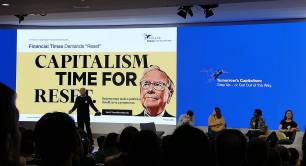Capitalism is working – but slowly, says BlackRock’s Larry Fink
CEO of investment giant BlackRock praises capitalism's success – but also points out some flaws in address to Spanish impact investing event.
Capitalism is working to enable the shift to a net zero economy – just slowly.
Larry Fink, CEO of US-based investment giant BlackRock joined a panel of speakers on the first day of the annual conference of the Spain National Advisory Board on Impact Investment (SpainNAB) which was held online and hosted at CaixaForum in Madrid.
He said: “I’m very bullish on capitalism. I do believe capitalism is working – but maybe slowly.”
The panel debated how the financial sector could reinvent capitalism and also included Sir Ronald Cohen, chair of the Global Steering Group on Impact Investment, and Gonzalo Gortazar, CEO of CaixaBank. It was moderated by Emilie Goodall, financial system lead of the World Benchmarking Alliance.
Fink, whose asset management firm has $9tn of assets under management, emphasised that innovation and entrepreneurship came from capitalism and that these qualities led to successes such as the creation of the Covid-19 vaccines in record time. “When the world comes together, we get solutions,” he said.
I’m very bullish on capitalism. I do believe capitalism is working
He explained that to investors such as BlackRock, “climate risk was investment risk”. Two-thirds of BlackRock’s assets were invested in pension funds, said Fink. That meant that he had a fiduciary responsibility over the long term – 30-plus years – to investees, and companies that didn’t pay attention to their impact on the climate were not good investments.
“We are not shy of having a voice for long-termism,” he said. “We have to play that role, we have to move capitalism forward.”
BlackRock was telling the owners of capital that the movement towards a net zero economy was positive, said Fink. “Transition isn’t a risk, it’s an opportunity,” he said. “We are moving, plotting, helping all the corporations to move forward. It’s a very delicate task.”
But he added: “One of the most beautiful things about finance is that if finance understands a problem, that problem is brought forward. We are seeing asset owners moving more capital into more sustainable products and investments.”
Growing gap between biggest and smallest companies
Fink highlighted some problems in capitalism today, including the unequal balance between large and small companies.
“In every industry, the better are getting better and the worse are getting worse,” he said. “We are consuming with fewer companies, and this is happening worldwide. We have this truly uneven component.”
“We are building great companies worldwide. At the same time it’s harder and harder for small companies to compete in that environment.”
He also pointed out that the pressure from society for companies to be aware of climate risk only fell on public companies. “We are seeing more of society asking more of companies,” he said. “But are we only asking public companies, not private companies?”
A call for a global taxonomy on sustainability reporting
Fink highlighted his frustration at the lack of consistency in reporting frameworks across the world for companies to show how they were incorporating sustainability into their activities. There were big differences between the USA and Europe, he said, and “BlackRock is in the crossfire”.
“We need a global taxonomy to measure every company properly,” he said. “I hope that is going to be one of the major accomplishments of COP26.”
- Want to go deeper? Much of what Larry Fink said this week is reflected in his 2021 letter to CEOs, an annual communication which is widely read by financial market watchers.
Thanks for reading Pioneers Post. As an entrepreneur or investor yourself, you'll know that producing quality work doesn't come free. We rely on our subscribers to sustain our journalism – so if you think it's worth having an independent, specialist media platform that covers social enterprise stories, please consider subscribing. You'll also be buying social: Pioneers Post is a social enterprise itself, reinvesting all our profits into helping you do good business, better.



